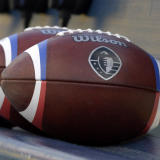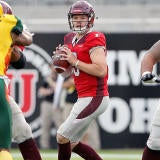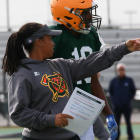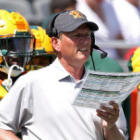A year before she joined the Arizona Cardinals as the first female assistant coach in the NFL, Jen Welter got a phone call.
She had finished her first and only season with the Texas Revolution of the Champions Indoor Football League in 2014 as a running back after more than a decade playing in women's professional and semi-pro football. "I got beat up a little bit," she admits. So her coach, Wendell Davis, gave her a call. He knew Welter had a passion for football and the knowledge to boot. She'd be an asset to the team as a voice for the players. He wanted Welter to rejoin the team in 2015 as the linebackers and special teams coach.
Incredulous, she hung up on him.
The next day, Davis called her back. He repeated his request, adding "Not a lot of guys will give you this chance." She remained uncertain. "I can't coach football," she said. He persisted. "You can't quit," he said. "You can't quit because you will be remembered as the girl who quit."
Welter recalled that exchange as the moment that "drop-kicked me into success." By the summer of 2015, her resume landed in the lap of then-Cardinals coach Bruce Arians, who hired her as an intern. By every metric, Welter is an accomplished person. She played almost 15 years of football and was a two-time gold medal winner in the IFAF Women's World Championship in 2010 and 2013. She holds multiple degrees, including a PhD in Psychology and a Master's in Sport Psychology. However, never did she realistically envision herself as football coach.
Now, in 2019, she's one of three female coaches in the AAF, alongside Birmingham Iron defensive line assistant Lo Locust and Arizona Hotshots wideouts assistant Jennifer King.
It's an initiative that came from the top down as the eight teams were being put together over the past year. As Hines Ward, the AAF's head of football development, noted, the blueprint was the NFL's Bill Walsh Minority Coaching Fellowship, which played a huge role in all three women getting hired. Locust, a longtime assistant coach at various levels, from high school to arena, spent the past year as a defensive line intern with the Baltimore Ravens while King was an intern with the Carolina Panthers.
"That's what the Alliance is all about. It's a league of opportunity," said Ward. "Not just for the players, coaches and GMs, but gender. I mean we want to get anybody. We'll search for any qualified candidate to be a part of the Alliance. Watching the opening weekends and seeing our female coaches on the sideline was just awesome. I got a big smile. I texted all of them to say, 'Enjoy this.' This is something that they've been searching for, for a long time."
But to hear Welter, King and Locust all speak on the matter of being a female football coach, there are some differing opinions. Welter felt the weight of being what many believe to be the first female assistant in the biggest sport in the U.S. "It's about coaching, first and foremost, but you can't ignore it," she said. "I was the first, so it was a conscious effort to make sure that when you're the first you can't be the last."
For King and Locust, though, their careers are perhaps less defined by that weight. "I love coaching. I love football and this just combines the two. I didn't set out to be the first of anything or anything like that," King said. "I've been very fortunate that the Panthers organization was amazing and the Hotshots organization has been amazing so I haven't had any problems or anything. The guys have been great, very receptive. The coaches have been great."
Locust echoed that sentiment. "One of the reasons I think [King] and I have that same shared mentality is that what we try and do is based on experience, and drawing from the fact that I don't want guys to look at me and think 'she's a woman who coaches.' I want to be the coach who happens to be a woman."
To be sure, all three want that from their jobs. In the end, they don't want to be treated any differently. And they deserve that. But the only way to normalize women coaching in the AAF (or the NFL) is to have women coaching football. "Look, it's something that we need to talk about," Welter said. "The AAF did it from Year One."
Will Brinson and Sean Wagner-McGough pick the Week 2 AAF games on the Pick Six Podcast, check it out here:
Locust recalls her interview with the AAF being as intense as any job process she's ever gone through. She wouldn't have had it any other way. Similarly, King, who pulled double duty as an intern for the Panthers while coaching women's basketball at Johnson & Wales University, attributes her success to always being prepared for whenever her opportunity came. From sunrise to sundown, she worked two gigs until she landed with the Hotshots in the AAF. In her situation, she wasn't sure if an opportunity like this would come again.
"I think it's just doing as good a job as possible and being prepared," she said. "Before I went to the Panthers, it's not like I wasn't preparing myself. It's not like it happened and then I wasn't ready. And that is one thing that me and Coach Rivera talked about a lot, just being prepared and doing your best in whatever role that you're in, so that was something that I really harped on and I think doing that got me here."
Her boss, Hotshots coach Rick Neuheisel, agreed. "I had a chance to talk to her before she came on board and I said 'I want you to take full advantage of this from the standpoint of learning everything there is to learn.' It's one thing to be called 'coach,' it's another thing to make yourself as valuable as you can to any future employer as a staff. That means she's got to learn all the computer stuff. She's got to learn how to break down all the films. She's got to learn how to input all that onto the computer so that in this day and age where data is so important. And she's been unbelievably receptive to that.
"She's going to be the one that's going to input all that tape, all those plays, supporting the scouting reports going forward, so that when she goes with her business card to whichever NFL employer wants to have her, they're going to realize she's complete. She not only has a great knowledge base and she's very, very smart," he continued. "She can go out there and throw the drills. She's a gifted athlete. She can go out there and explain the drills and get what she wants in terms of what she wants from the wide receiver position, and then she's valuable behind the scenes in terms of inputting everything, and has a clear voice in the meeting room."
While there is a definite developmental slant in the AAF, all three women are still coaches. "I'm not an intern. I'm not here for show," Locust said. "I'm here to actually contribute and they include me in everything and expect just as much of me as they would any other assistant coach. That's being legitimate in this process and in this journey, that means more to me than anything."
Welter recalls Arians saying that the second a woman can make players better, she'll be hired. All three are in the AAF to make players better and they wouldn't be here if they couldn't. Welter pointed to the value female coaches can bring to player development. "A lot of them have been raised by single moms," she said. "Coaching staffs are made up of different life experiences." To her point, there may be a way a female coach can reach a player that a male coach can't. So far, Ward has seen that positive reenforcement.
"The feedback has been great," Ward said. "And I love the reaction from players. I went down to training camp, and I saw at practice, the players getting help from our female coaches. I thought it was amazing to me that our players really trusted in our female coaches to know what they're talking about. To ask them for extra help after practice is just awesome. The more and more we continue to spotlight our females, I think the more and more our football community will be more receptive of the pattern of female coaches on the sideline."
"We sometimes as the older generation think this is going to be hard to get people to understand," Neuheisel added. "We are way over our skis to think that it's hard. The kids today are so much more tolerant of change than my generation. It's fun to see."
Ward told CBS Sports that another three to four female coaches are waiting in the wings to be hired by AAF teams for the 2020 season. The AAF is also making a push to hire more female trainers and front office employees. Additionally, Ward added that ex-military personnel with disabilities will also be added to the list of those in consideration for future jobs.
To be clear, the AAF isn't a charity. None of the three female coaches in the Alliance have asked for a handout. While cynics might shrug off the effort to hire female coaches, the reality is it matters to those who historically haven't had an avenue to be considered. If the ultimate goal for so many of these players and assistant coaches is to get back to the NFL, this chance to earn their way matters to them.
"You do tend to look at like big picture at times, but there's so many steps in this process," Locust said. "I have the knowledge, I have the experience, I have connections, but I want to earn a spot. I don't want to be just that initiative, or that woman coach. I want to earn a spot."
















